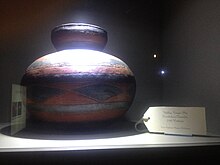Tonga (ethnic groups)
Tonga (one person Mutonga , several people, entire Batonga ethnic group ) is the name of a Bantu-speaking ethnic group in southern Zambia and in the north of the neighboring countries of Zimbabwe and Botswana and another ethnic group living in northern Malawi .
Valley and Plateau Tonga
The Valley Tonga and the Tonga Plateau in Zambia, Mozambique and northern Zimbabwe speak ChiTonga . For a long time they lived completely isolated in the inaccessible broad valley floor of the Zambezi . It was only after 1955 that they were relocated to the higher savannah as a result of the construction of the Kariba dam . Their places today are Binga , Gwembe , Siavonga , Monze and Sinazongwe and the areas adjacent to them. They are also found as a minority in Namwala and Mazabuka . In the struggle for the independence of Zambia, the Tonga (namely Harry Nkumbula ) played an important role. Their number is now estimated at 1.5 million, 1.38 in Zambia and 0.14 in Zimbabwe. They are mostly subsistence farmers .
They traditionally belong to the acephalous societies ( tribes without rulers ), t'onga means "without heads". The neighboring tribes of the plateau and the English colonial power, some of which were under a strict chief organization , as a result of their migration past , they were considered to be disorganized and without more complex social connections; Ethnological studies ( Elizabeth Colson ) have established their connection through language, rain shrine cult and customs.
Ancestor worship is part of the traditional religion of Tonga . Ancestral spirits can ensure rain and a good harvest, if set rules are not observed, they can bring disease. Mashawe spirits are appeased through rituals of possession, but not attempted to drive them out , as there is no strict division into good and evil and the spirits are also supposed to protect against witchcraft.
Lakeside Tonga
Another ethnic group are the Lakeside Tonga in northern Malawi and in Tanzania on Lake Malawi . Tonga used to live on the lower Shire as well.
The Tonga settled in the areas around Matema and Karonga until they were subjugated by the Ngoni in 1855 . They lived matrilineally and without a central government. Vague traditions claim that they came from the north.
Basil Davidson describes this Tonga in his book African Kingdoms as open and enterprising. They considered freedom of speech to be of vital importance and made a clear distinction between their ties to their village and those of their relatives. They can move freely between the two. They say: quarrels, verbal battles and arguments are typical of a village. Davidson quotes van Velsen: " ... they are very good at manipulating others and coping with surprising situations well because they have a long experience of getting along with others. " And further: " In the modern world we would like them as union leaders, politicians Find managers in high positions. "
After the submission to the Ngoni, the Tonga stayed where they lived. But their young men were committed to the regiments of the Ngoni. There they were soon assessed as brutal and bloodthirsty than the Ngonis, into whom they however never integrated or even adopted their name. In 1875 the Tonga revolted against the Ngoni and lost, but gave the signal for a revolt of all Tonga. It was up to the Livingstone Mission in Livingstonia that the Tonga were not exterminated here. Since then they have lived in the mountains, in higher-lying villages. In 1993 about 250,000 Tonga were counted.
Tonga were mostly fishermen and grew manioc as a staple food. Since they went through the training in the missions, they soon earned higher wages during the German colonial times and appear as porters, semi-skilled workers and auxiliary troops for the attack on Kamaurunga. Half of the soldiers in these auxiliary troops wanted to earn the bride price for the marriage in this way.
The Tonga had adopted the Ngoni custom of paying cattle as a bride price. The relatives were obliged to make further payments if a child fell ill. Divorce was difficult for a man, easy for a woman. He could not disown his wife without a public hearing, while she and her family could separate from him at any time without any formality. It only got more difficult when he came from an important family.
The Tonga believe in a supreme god, who however remained indefinite and almost forgotten because the ancestors were more important. Their spirits were summoned. Shamans and those raptured by spirits sought prophecies and messages from the ancestral spirits. The spirits of the deceased were venerated, with which they lived on after death and had an effect on the living. They could bring a curse and a blessing on the family, curse when they were attacked or when a hidden sin remained. These spirits lived indefinitely, but not forever. They can disappear into nowhere if they no longer want to stand up for the living. Some Tongas on Lake Malawi say that by taking certain medicines, a person can make sure which animal they want to transform into after they die.
"Life-affirming society"
The social psychologist Erich Fromm analyzed the willingness of 30 pre-state peoples, including the Lakeside Tonga, to use ethnographic records to analyze the anatomy of human destructiveness . In conclusion, he assigned them to the “life-affirming societies”, whose cultures are characterized by a pronounced sense of community with great social equality, friendly child rearing, tolerant sexual morality and a low tendency to be aggressive. (see also: "War and Peace" in pre-state societies )
Individual evidence
- ↑ Erich Fromm: Anatomy of human destructiveness . From the American by Liselotte et al. Ernst Mickel, 86th - 100th thousand edition, Rowohlt, Reinbek near Hamburg 1977, ISBN 3-499-17052-3 , pp. 191-192.
